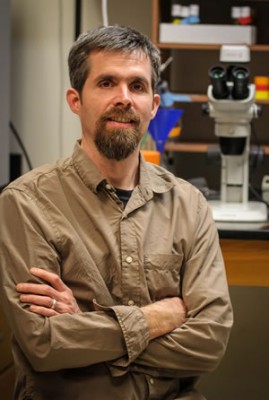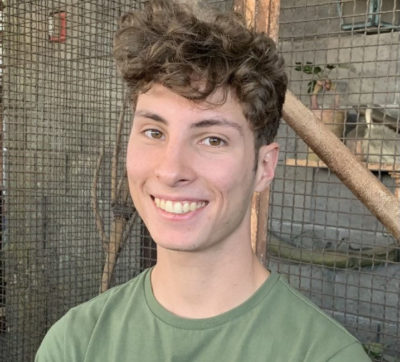 Associate Professor of Biology Patrick Ferree
Associate Professor of Biology Patrick Ferree Claremont, Calif. (August 2, 2021) — W.M. Keck Science Department Associate Professor of Biology Patrick Ferree received a $923,538 National Science Foundation (NSF) four-year grant to study how certain “selfish” genetic elements alter inheritance patterns at the molecular level.
Ferree’s study examines how a class of non-essential chromosomes called B chromosomes disrupt normal inheritance patterns in plants and animals. The work centers on a B chromosome that causes harmful reproduction effects and sex ratio distortion in Nasonia vitripennis, or jewel wasps. These effects benefit the B chromosome, which is the reason it’s considered “selfish,” even parasitic.
The project will facilitate rigorous research training opportunities at Keck—the interdisciplinary science department for Pitzer, Scripps, and Claremont McKenna Colleges—for undergraduate science students, with the goal of enhancing STEM retention in higher education.
“I’m a big believer in engaging undergraduate students in meaningful and relevant questions in biology,” Ferree says. “The students here have a lot of zeal and motivation to accomplish high-caliber work. They bring fresh ideas to the table.”
 Max Richmond ’23
Max Richmond ’23Pitzer student Max Richmond ’23 is one of those highly engaged, motivated students. He began working in Ferree’s laboratory after reading about his genetic research with the tiny, iridescent jewel wasps and thinking, “This is the coolest thing I’ve ever seen in my life.”
What did Richmond find so cool? The existence of such an “extra, weird, mysterious chromosome” in a jewel wasp.
“All humans and every organism have a set number of chromosomes inside of them for the essential functions that keep us alive,” Richmond says. “In this little wasp, there’s this extra, weird, mysterious, non-essential chromosome that shouldn’t be there, and no one knows why it’s there, what it’s doing, or how it does it.”
They do know that most genetic elements function cooperatively to ensure an organism’s fitness, but certain selfish elements, like this one, disobey the normal rules of genetics to gain a transmission advantage. This selfish chromosome can harm the organism in question—by converting the wasp offspring’s gender from female to male. During jewel wasp reproduction, for example, a selfish B chromosome destroys the part of the genome that comes from the father and takes its place, resulting in all-male broods that only carry hereditary material from the mother and the selfish chromosome. While this transmission ensures the ongoing survival of the B chromosome (indeed, this chromosome can only be transmitted by fathers), it is detrimental to the health of the jewel wasp population.
“In a population of sexually reproduced organisms, mothers are essential,” Ferree says. “When you have fewer females in a population, that’s going to have repercussions for the population’s overall health.”
Those repercussions are the reason Richmond calls the selfish B chromosome a “creepy concept of a chromosome,” one that doesn’t help the organism in any way and is, in fact, willing to sacrifice a species so the selfish chromosome can survive. If such genetic elements were not able to manipulate the organism in such ways, they would not be transmitted and would eventually be lost. However, there is a tradeoff—such manipulations may immediately help the selfish element, but on the long term, they will likely harm the organism. A big goal of research groups like Ferree’s is to better understand such conflicts between selfish genetic elements and whole organisms.
The project will use a combination of modern genomic, genetic, molecular, and cytological methods (basically, techniques used in the study or manipulation of cells) to study intergenomic conflict, the condition that occurs when selfish genetic elements harm an organism for their own benefit. Ferree’s recent research has revealed that a toxin-like gene, called haploidizer (the only gene known to underlie selfish chromosome behavior in any organism), is expressed by the selfish B chromosome in jewel wasps. By examining how B chromosomes alter inheritance through individual gene expression, the study may explain why these chromosomes behave so strangely.
The grant will also facilitate the creation of a new laboratory-based molecular biology seminar course in the W.M. Keck Science Department. The course will focus on using a genetic screen to look for proteins in the jewel wasp’s cells that could be targets of the haploidizer toxin. Students from Pitzer, Scripps, and Claremont McKenna Colleges, as well as students from Citrus College, a community college in Glendora, CA, will be involved in the research.
Richmond says that giving students hands-on experience in a “wet” laboratory—where biological matters can be tested through different types of experiments—is invaluable.
“Having your own project in a lab makes you want to get into a lab, to see progress, to nurture this thing that you’re helping build—knowing that you’re physically doing it with your hands is the most rewarding thing,” Richmond says.
Central to that experience is Ferree’s approach to both teaching and research at Keck.
“It’s always about the students for him,” Richmond says. “Patrick guides you but doesn’t take over—he helps us the perfect amount.”
Patrick Ferree earned his BS in biology from UNC Chapel Hill, his PhD in molecular and cellular biology from University of California, Santa Cruz, and was a postdoctoral fellow at Cornell University. He received NSF’s prestigious CAREER grant in 2015. Last year, Science Advances published a study Ferree co-authored about the “selfish” B chromosome in jewel wasps. He has taught at the W.M. Keck Science Department since 2010.
Adapted from “Patrick Ferree Receives National Science Foundation Grant” by Scripps College